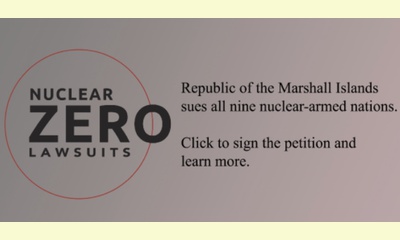|
|
U.S. Conference of Mayors Adopts Bold Resolution on Nuclear Disarmament
un articulo por Nuclear Age Peace Foundation (abridged)
The U.S. Conference of Mayors (USCM), a non-partisan
association of America’s big cities, on June 23, 2014
unanimously adopted a sweeping new resolution Calling for
Constructive Good Faith U.S. Participation in International
Nuclear Disarmament Forums at its 82nd annual meeting in
Dallas, Texas. According to USCM President Kevin Johnson,
Mayor of Sacramento, California, “These resolutions, once
adopted, become official USCM policy.” 
click on photo to enlarge
The resolution notes that on April 24, 2014, the Republic of
the Marshall Islands (RMI) filed landmark cases in the
International Court of Justice against all nine nuclear-armed
nations, claiming that they failed to comply with their
obligations under the nuclear Nonproliferation Treaty (NPT)
and customary international law to pursue negotiations for the
global elimination of nuclear weapons. They also filed a
companion case in U.S. Federal District Court.
In its resolution, the USCM “commends the Marshall Islands
for calling to the world’s attention the failure of the nine
nuclear-armed states to comply with their international
obligations and calls on the U.S. to respond constructively and
in good faith to the lawsuits brought by the RMI.”
The resolution states that “the people of the Republic of the
Marshall Islands continue to suffer from the health and
environmental impacts of 67 above-ground nuclear weapons
test explosions conducted by the U.S. in their islands between
1946 and 1958, the equivalent of 1.6 Hiroshima-sized bombs
detonated daily for 12 years.”
Upon hearing news of the USCM resolution, RMI foreign
minister Tony de Brum stated,
“We appreciate very much the US Conference of Mayors
supporting our modest efforts to rid the world of nuclear
weapons. This endorsement is acknowledged with deep
gratitude on behalf of the Government and the People of the
Marshall Islands, and most especially those who have lost
loved ones in the mad race for nuclear superiority, and those
who continue to suffer the scourge of nuclear weapons testing
in our homeland” . . .
Over the past three years there has been a new round of
nuclear disarmament initiatives by governments not
possessing nuclear weapons, both within and outside the
United Nations. Yet the U.S. has been notably absent from this
process. The USCM resolution calls on the U.S. administration
to participate constructively in negotiations to achieve a
nuclear weapons free world, noting that “forty-four years after
the NPT entered into force, an estimated 16,400 nuclear
weapons, most held by the U.S. and Russia, pose an
intolerable threat to humanity, and there are no disarmament
negotiations on the horizon.”
Further, the resolution states that “The U.S. and the eight
other nuclear-armed states are investing an estimated $100
billion annually to maintain and modernize their nuclear
arsenals while actively planning to deploy nuclear weapons for
the foreseeable future.”
The resolution “calls on the President and Congress to reduce
nuclear weapons spending to the minimum necessary to
assure the safety and security of the existing weapons as they
await disablement and dismantlement, and to redirect those
funds to meet the urgent needs of cities.”
The complete Mayors Resolution can be found at: www.wagingpeace.org/mayors-resolution.
|








|
DISCUSSION
Pregunta(s) relacionada(s) al artículo :
Can we abolish all nuclear weapons?,
* * * * *
Comentario más reciente:
'THE WORLD IS OVER-ARMED AND PEACE IS UNDER-FUNDED'
30 August 2012 — The following opinion piece by Secretary-General BAN Ki-moon has appeared in leading newspapers in Argentina, Bangladesh, Burundi, China, Germany, India, Iran, Italy, Japan, Lebanon, Malaysia, The Philippines, Republic of Korea, Russia, Serbia, Turkey, Ukraine and European weekly publications and has been translated into 10 languages.
Last month, competing interests prevented agreement on a much-needed treaty that would have reduced the appalling human cost of the poorly regulated international arms trade. Meanwhile, nuclear disarmament efforts remain stalled, despite strong and growing global popular sentiment in support of this cause.
The failure of these negotiations and this month's anniversaries of the atomic bombings at Hiroshima and Nagasaki provide a good opportunity to explore what has gone wrong, why disarmament and arms control have proven so difficult to achieve, and how the world community can get back on track towards these vitally important goals.
Many defence establishments now recognize that security means far more than protecting borders. Grave security concerns can arise as a result of demographic trends, chronic poverty, economic inequality, environmental degradation, pandemic diseases, organized crime, repressive governance and other developments no state can control alone. Arms can't address such concerns.
Yet there has been a troubling lag between recognizing these new security challenges, and launching new policies to address them. National budget priorities still tend to reflect the old paradigms. Massive military spending and new investments in modernizing nuclear weapons have left the world over-armed -- and peace under-funded.
Last year, global military spending reportedly exceeded $1.7 trillion – more than $4.6 billion a day, which alone is almost twice the UN's budget for an entire year. This largesse includes billions more for modernizing nuclear arsenals decades into the future.
This level of military spending is hard to explain in a post-Cold War world and amidst a global financial crisis. Economists would call this an "opportunity cost". . ... continuación.

|
|









